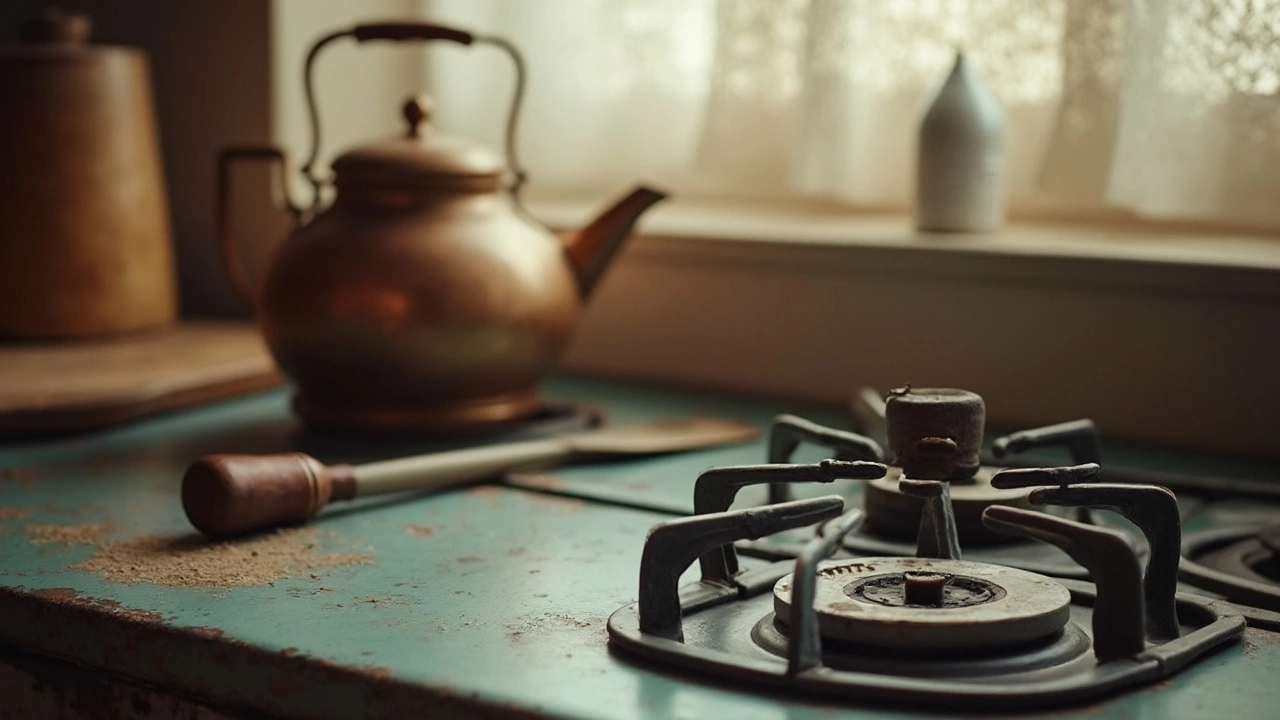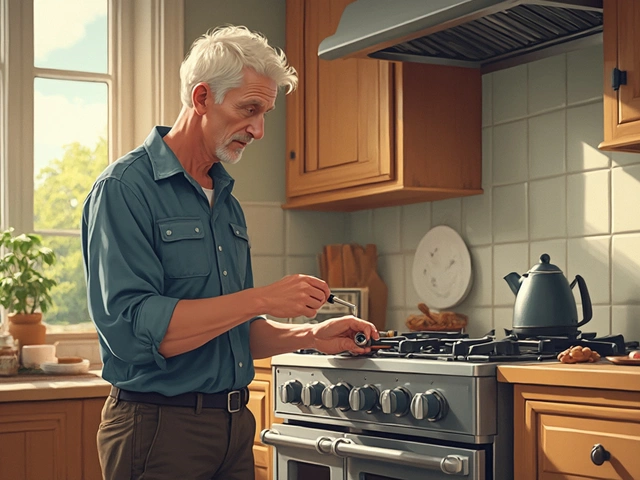How long should you expect your gas hob to stick around? Well, on average, a high-quality gas hob can last you a good 10 to 15 years. Of course, this isn't a one-size-fits-all number. The lifespan can vary based on how often you cook, how well you maintain it, and a bunch of other factors.
Now, what's affecting these numbers? Things like the build quality of your hob, frequency of use, and, no surprises here, how you take care of it. Regular maintenance can go a long way in extending its life. Of course, accidents happen, and components wear out over time, but a little love goes a long way.
You might wonder when it's time to give your hob some tender loving care. Look out for signs like uneven flames, clicking sounds that don't lead to ignition, or even persistent gas smells. These can be your hob's way of saying, 'Hey, I need some attention!' Ignoring these signs? Not a good idea.
- Introduction to Gas Hob Lifespan
- Factors Affecting Longevity
- Signs Your Hob Needs Attention
- Simple Maintenance Tips
- When to Repair or Replace
- Expert Advice and Recommendations
Introduction to Gas Hob Lifespan
Ever paused to wonder how long your trusty gas hob is going to last? Sure, it feels like it can go on forever, but just like any other appliance, it has its limits. Generally speaking, a well-maintained gas hob has an average lifespan of 10 to 15 years. But here's the kicker - how you use and maintain your hob can seriously affect this number.
Let's talk about what makes a gas hob tick for so long. First off, the quality of materials used during manufacturing plays a huge role. If you're buying a top-notch brand, chances are, it’s built to last. However, if your cooking partner sees a lot of action—say, you're a meal-prep enthusiast or love hosting elaborate dinners—it might wear out a tad quicker.
Factors Influencing Lifespan
So, what really affects the life expectancy of gas stoves? Believe it or not, simple things like regular cleaning and dealing with minor repairs right away can have a massive impact. Leaving grease and grime to party on your hob corrodes its surface and clogs burners over time.
The Importance of Proper Usage
Using your gas hob the right way is also a game-changer. For example, ensuring proper pot size for burner size not only ensures efficient cooking but helps keep the burner's lifespan in check. Misusing the burners can lead to uneven flame distribution and eventual wear and tear.
Stats to Consider
| Usage Frequency | Expected Lifespan |
|---|---|
| Seldom used (a few times a week) | 15+ years |
| Moderate use (daily cooking) | 12-15 years |
| Heavy use (multiple meals daily) | 8-12 years |
These are just some guidelines to help you get a general idea. Of course, this can vary, but knowing the average can help you plan for future appliances. So next time you're simmering a pot of your favorite soup, remember, your gas hob needs some attention too!
Factors Affecting Longevity
When it comes to how long your gas hob will keep working, several things play a part. First off, let’s talk about build quality. Not all hobs are created equal. You'll find that the more you invest upfront in a good brand, the more likely it is to enjoy a longer lifespan.
Usage Frequency
How often do you cook? If you're firing up your hob every day for breakfast, lunch, and dinner, it’ll naturally wear out faster than one in a single-person household used twice a week. It's just the nature of things – more use means more wear.
Maintenance Habits
Do you clean your hob regularly? Simply keeping those burners and grates clean can prevent clogs and reduce wear and tear. By wiping it down after use, you're not just making it look good, you're also protecting it from corrosion and build-up.
Installation Quality
A poorly installed gas hob can cause headaches later. Gas connections need to be secure to prevent leaks, and the whole setup must be stable to avoid undue stress on the parts. It’s always smart to have a professional take care of the installation.
Environmental Factors
The environment can also influence your hob’s life. If your kitchen is prone to humidity or drastic temperature changes, these can accelerate rusting and component wear. Proper ventilation helps control these conditions.
| Factor | Impact Level | Recommendation |
|---|---|---|
| Usage | High | Limit to regular cooking |
| Maintenance | High | Weekly cleaning suggested |
| Installation | Moderate | Professional installation advised |
| Environment | Low to Moderate | Ensure good ventilation |
Understanding these factors gives you a better idea of how long your hob might last, but also clues you in on what you can do to stretch its life. Treat your gas hob well, and it’ll return the favor with many years of service.
Signs Your Hob Needs Attention
Your gas hob is a trusty kitchen companion, but like all things, it has its moments when it asks for a little help. Recognizing these signals early can save you from bigger headaches down the road.
1. Strange Noises
A happy hob should sound pretty quiet. If you start hearing clicking and it's not igniting, that could mean trouble. Sometimes, it's just a bit of dirt causing the issue, but it could also mean deeper electrical problems.
2. Uneven Flames
Blue flames are your buddy; they mean everything's working as it should. If they're yellow or orange and dancing unevenly, that's your hob waving a red flag. This could indicate your burners are clogged or there's an air-to-gas ratio issue.
3. Persistent Gas Smell
This one's straightforward. If you smell gas, and it's not just for a quick second during lighting, shut everything off and get it checked. Gas leaks are no joke and need immediate attention.
4. Burners That Won't Light
If you've got a burner that just won't light, even with some effort, it might be the ignition system or blocked gas flow. Clean it out first, but don't ignore it if it's stubborn.
5. It's Taking Forever to Cook
Notice that your noodles take ages to boil lately? It could be a sign the burners aren't working efficiently. Over time, blockages or wear-out can lower the performance of your gas hob.
| Issue | Possible Causes |
|---|---|
| Strange Noises | Debris in burners, electrical issues |
| Uneven Flames | Burner clogs, incorrect gas flow |
| Gas Smell | Potential leaks, safety risk |
Noticing these signs isn't the end of the world, but they're your cue to take action. Most times, a bit of cleaning and maintenance does the trick. But if issues stick around, don’t hesitate to call in a pro to get your kitchen running smoothly again.

Simple Maintenance Tips
Keeping your gas hob in top shape doesn't take a ton of effort, but it does need a bit of regular attention. Let's break down some practical ways to keep your kitchen appliance burning bright for years to come.
Regular Cleaning
This might sound obvious, but cleaning your hob routinely is a huge part of maintenance. Wait until it's cool, and start by removing the grates and burner caps. Use a damp cloth or mild detergent to wipe off spills and food splatters. Avoid harsh chemicals—they can damage the surface.
- Clean around the burners to prevent clogs. Use a toothpick to clear tiny holes.
- For stainless steel surfaces, a bit of vinegar can go a long way in keeping them shiny without scratching.
- Make it a habit to clean it weekly.
Check for gas leaks
Gas leaks are no joke. Every so often, mix a bit of soapy water and apply it around the gas connections. If you see bubbles forming, you've got a leak. Call a professional right away.
Inspect Components
Regularly check burner caps for any misalignment. Igniters can be vulnerable too; ensure they're free from moisture and grease. A dirty or wet igniter can malfunction, causing ignition failures.
Replace Worn Parts
Grates and burner caps wear out over time. If they've seen better days, get replacements from the manufacturer. Keeping everything in good condition ensures uniform and efficient cooking.
TLC Once a Year
Consider getting a professional to inspect your hob annually. They'll do a thorough check, ensuring all connections and components are working as they should.
By sticking to these maintenance tips, you're not just extending the life of your gas hob, but also making sure your meals cook safely and evenly. Keeping it clean and frequently checking the parts means less stress about unexpected repairs down the road. Happy cooking!
When to Repair or Replace
So you've noticed your gas hob isn't performing like it used to. Should you fix it, or is it time for something new? Let's break it down.
Assessing the Issue
First things first, identify the problem. Is it just a burner that won't light? You might just need a quick fix. Maybe it's a broken ignition switch, which is usually a simple repair for a skilled technician.
But if you find multiple issues or persistent problems like uneven flames or strange noises, it could mean your gas hob is reaching the end of the line.
Cost of Repair vs. Replacement
Think about the cost. Small fixes like replacing a burner cap or cleaning the clogged parts may cost you a few bucks. But if you're looking at something pricier, like repairing a gas leak or damaged control valves, those costs can quickly add up.
If these repairs start to cost close to, or more than, half the price of a new hob, replacing might be the better move.
Age Matters
Age plays a big role. If your hob is nearing its 10-15 year lifespan, investing in repairs might not be worth the hassle. Appliances don't last forever, and sometimes an upgrade means better efficiency and new features you didn't even know you needed.
Energy Efficiency
Considering energy efficiency is also vital. Newer models are typically more energy-efficient, reducing your bills and carbon footprint. If you're conscious about energy consumption or find your bills creeping up, replacing could provide long-term savings.
Safety First
Gas stove repair isn't just about performance; safety is paramount. If you smell gas or your stove requires constant tinkering to work, the potential danger might suggest it's time for a new model. Better safe than sorry!
| Decision Criteria | Repair | Replace |
|---|---|---|
| Cost | Less than 50% of new hob | More than 50% of new hob |
| Age | Below 10 years | Above 10 years |
| Efficiency | Meets current needs | Improved energy savings |
| Safety | No recurring issues | Persistent safety concerns |
Your decision to repair or replace should hinge on a balance of these factors. Weigh the pros and cons, because making the right call can save you time and money down the line.
Expert Advice and Recommendations
When it comes to prolonging the lifespan of your gas hob, a few insider tips can make all the difference. Let's break it down to the essentials.
Regular Maintenance is Key
The folks who've been in the appliance game for a while swear by a simple rule: clean your hob regularly. Sounds easy, right? It's because it is. Each time you cook, wipe down the hob with a soft cloth. This prevents grease build-up, which can eventually wear down parts of your stove and impact performance.
Don't forget to check the burner caps and heads. If they get clogged, you might experience uneven flames. Use a small brush or even an old toothbrush to gently clean these parts. It's that easy!
Annual Check-Up
Just like you'd go for a yearly health check, your hob needs one too. It's not just about what you can see; sometimes, problems lurk deeper in your appliance. Getting an expert to look over your kitchen appliance annually can save you from unexpected breakdowns.
Repair or Replace?
It happens—parts wear out. When it does, don't rush to replace your entire hob. Many components, like igniters or knobs, are easy and affordable to replace. But there's a point when repair costs near the price of a new hob. That's when replacement makes more sense.
If you're facing frequent issues or if your trusted hob is nearing the 15-year mark, it might be time to shop for a new one. Older models can lack the efficiency and safety features modern hobs offer.
Energy Efficiency Stats
| Model | Average Lifetime (years) | Energy Efficiency |
|---|---|---|
| Standard Gas Hob | 10-15 | 85% |
| Modern High-Efficiency Hob | 12-17 | 95% |
Switching to a modern high-efficiency hob can reduce your gas use by up to 10%, saving money and environmentally-friendly.
So, there you have it. Armed with this knowledge, you're well-equipped to keep your gas hob running smoothly and effectively for years to come. Remember, a little upkeep goes a long way.




